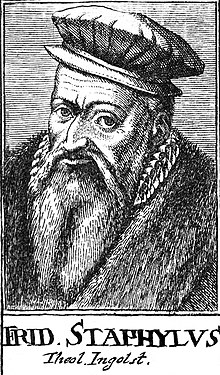Friedrich Staphylus
Friedrich Staphylus (born August 27, 1512 in Osnabrück , † March 5, 1564 in Ingolstadt ) was a German Lutheran and Roman Catholic theologian.
Life
Lüdeken Stapellage's son and his wife Anna Birkmann were orphaned at an early age. His uncle Eberhard Birkmann therefore took over his upbringing, after which he moved to Danzig. He later continued his education in Lithuania , where he learned the Lithuanian and Russian languages . He began his first studies at the University of Krakow , where he improved his knowledge of the Polish language. He continued philosophical and theological studies in 1530 at the University of Padua . In 1533 he returned to Danzig . In 1536 he continued his studies at the University of Wittenberg , where he was the best graduate on May 8, 1541, and was admitted to the Senate of the Philosophical Faculty on October 18, 1543.
On the recommendation of Philipp Melanchthon , he was appointed professor of theology at the University of Königsberg in 1546 as the successor to the late Stanislaus Rapagelanus . As an initially Orthodox representative of the Protestant concept of teaching, he got into a dispute with Wilhelm Gnapheus , who was eventually removed from university service and expelled from Prussia. In the winter semester of 1547/48 he was rector of the University of Königsberg , but could not meet the expectations placed on him. In the autumn of 1548 he therefore gave up his theological lectures. However, he remained in Königsberg as a councilor to Duke Albrecht of Prussia .
An epidemic caused him to leave Konigsberg. He went to Breslau , where he married Anna, daughter of Johann Hess , on October 19, 1549 . In 1550 he returned to Königsberg, where he got into a momentous dispute with Andreas Osiander . This prompted him to submit his farewell to the Duke's court in 1551 and to move to Danzig in 1552, where he wrote Synodus sanctorum patrum antiquorum contra nova dogmata Andreae Osiandri (Nuremberg 1553), which is in Roman Catholic tradition . He returned to Breslau, where he fully converted to Catholicism in 1553. He then went into the service of Bishop Balthasar von Promnitz in Neisse , where he campaigned for the establishment of a Catholic seminary .
From 1555 he worked as consul Ferdinand I in the imperial religious policy and as such took part in the Worms Religious Discussion in 1557 . He knew how to use the internal disputes in the Evangelical Church for himself. He had subsequently published very polemical writings against the Protestants. After he had also participated in the Council of Trent , in 1558 the Bavarian Duke Albrecht V of Bavaria (1528–1579) appointed him to the council, he received his doctorate in theology on May 19, 1559 in Augsburg on the basis of a papal directive . As such, he was appointed professor at the University of Ingolstadt to teach history, humanities and theology. He arrived in Ingolstadt in May 1560. Here he participated in the reform of the Jesuit university as superintendent and established himself in the burgeoning Counter-Reformation. For this he received the approval of the Pope and was ennobled by the Emperor on July 15, 1562.
Works
- Diodori siculi fragmenta ex graeco in latinum versa.
- Historia et Apologia Utriusque Partis, Catholicae Et Confessionariae, de dissolutione Colloquii nuper Wormatiae instituti ad omnes Catholicae fidei Protectores. Vienna 1558 ( online )
- Theologiae Martini Lutheri Trimembris Epitome. Worms 1558 ( online )
- Actual and full description White with the wonderful Besingknuß so the Rom. Kay. May. Emperor Ferdinand irer May. Dear brother and Kayser Carlen the fifth most laudable memorial on the 24th and 24th. February 25th of the 59th jars in Augspurg ... held in order, lost everywhere. Dillingen 1559 ( online )
- Historam de vita, morte et gestis Caroli V. Augsburg 1559 ( online )
- Defensio Pro Trimembri Theologia M. Lvtheri, Contra Aedificatores Babylonicae Tvrris. Phil. Melanthonem, Shvvenckfeldianum Longinum, And. Musculum, Mat. Flacc. Illyricum, Iacobum Andream Shmidelinum. Dillingen 1561
- Advance to save the book. Of the correct understanding of the divine word, of the translation of the Teütschen Bible, and of the uniqueness of the Lutheran preachers. Ingolstadt 1561 ( online )
- Christian counter-report to the godly common Layen. Ingolstadt 1561 ( online )
- Prodromus D. Friderici Staphyli, In Defensionem Apologiae suae, de vero germanoque scripturae sacrae intellectu etc. Latine redditus per F. Laurentium Surium Carthusianum. Cologne 1562
- Hysterodromum.
- Lucubrationes super plurimas sessions ad Concilium cum libris II. De Christiana republica.
- Oratio de bone litteris. 1550
- Synodus Patrum versus Osiandrum. 1553
- From the last and great apostasy that is to happen before the future of the Antichrist. 1565 ( online )
literature
- Staphylus, Friedrich or Staffel. In: Johann Heinrich Zedler : Large complete universal lexicon of all sciences and arts . Volume 39, Leipzig 1744, columns 1228-1230.
- Paul Tschackert : Staphylus, Friedrich . In: Allgemeine Deutsche Biographie (ADB). Volume 35, Duncker & Humblot, Leipzig 1893, pp. 457-461.
- Paul Tschackert: Staphylus, Friedrich . In: Realencyklopadie for Protestant Theology and Church (RE). 3. Edition. Volume 18, Hinrichs, Leipzig 1906, pp. 776-771.
- Ute Mennecke_Haustein: Staphylus, Friedrich . In: Theologische Realenzyklopädie (TRE). Volume 32, de Gruyter, Berlin / New York 2001, ISBN 3-11-016712-3 , pp. 113-115.
Web link
Individual evidence
- ^ Julius Köstlin: The Baccalaurei and Magistri of the Wittenberg philosophical faculty 1503-1560, from 1887 to 1891 in Halle with Max Niemeyer
| personal data | |
|---|---|
| SURNAME | Staphylus, Friedrich |
| BRIEF DESCRIPTION | German Lutheran and Roman Catholic theologian |
| DATE OF BIRTH | August 27, 1512 |
| PLACE OF BIRTH | Osnabrück |
| DATE OF DEATH | March 5, 1564 |
| Place of death | Ingolstadt |
